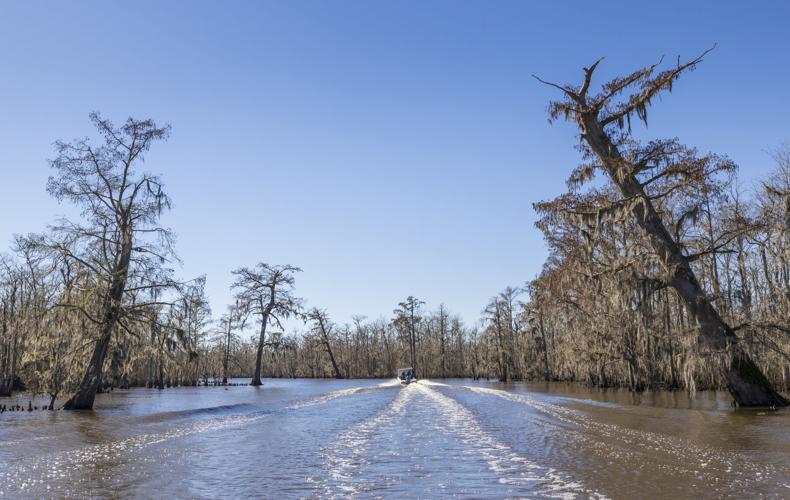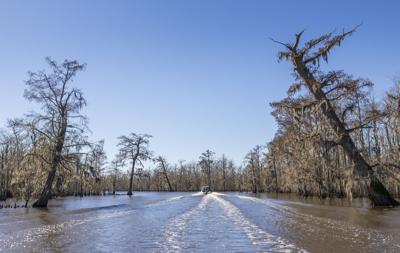A state appeals court has found that a St. John the Baptist Parish judge violated state law in attempting to hold trials next month to determine how much the state must pay for some properties it expropriated for construction of the $309 million Maurepas Swamp freshwater diversion project.
Two 5th Circuit Court of Appeal panels, ruling in two different expropriation cases, found that 40th Judicial District Judge Vercell Fiffie improperly attempted to set trials for early January in both cases after earlier appellate rulings ordered him to grant the state Coastal Protection and Restoration Authority’s expropriation requests under the state’s “quick take” provisions. Those allow the state to determine the value of seized property, and then provide landowners up to a year to challenge the state’s prices.

Judge Vercell Fiffie of the 40th Judicial District Court
In one case, the 5th Circuit panel includes Judges Stephen Windhorst, John Molaison and Scott Schlegel. In the other, the judges are Fredericka Wicker, Jude Gravois and Marc Johnson.
In both cases, Fiffie scheduled trial dates to determine the value of the land even though no landowner had requested a review of the state’s proposed payments, the two appeals panels ruled.
“The trial court erred by setting the matter for trial without permitting the landowners to be served and to file responsive pleadings. Any judgment obtained in violation of the quick-take procedures as stated herein would result in the judgment being null and void,” said Windhorst in one of the rulings.
On Dec. 4, the appeal panels reversed earlier Fiffie rulings that declared both expropriation cases invalid, finding that Fiffie was not following the state’s quit-claim law. They ordered him to issue expropriation notices by Dec. 8.
Fiffie did so, but his orders contained handwritten notes saying: “All previously set hearing dates are to be maintained.”
Those hearing dates included the trial dates to determine the value of the property. The appeals court rulings declared Fiffie’s issuing of those trial date orders “sua sponte,” or on his own authority, again violated state law.
Fiffie did not respond Thursday to a request for comment on the new appeals rulings.
The two expropriations involve nearly 38 acres of land along the path of the diversion, which will funnel fresh water from the Mississippi River into the swamp to revive it.
The diversion has been approved by the Army Corps of Engineers as required “environmental mitigation” for construction of the West Shore Lake Pontchartrain hurricane levee project, which aims to protect St. John and St. James parishes from storm surge. The state is building a section of the hurricane levee as part of the eastern border of the diversion.
Fiffie’s failure to act on the state Coastal Protection and Restoration Authority's expropriation request within six weeks forced the state to file motions on Oct. 25 demanding the judge take action. When he still failed to do so, the CPRA filed writs with the 5th Circuit asking it to force Fiffie to comply with state law.
On Nov. 8, two three-judge panels ordered Fiffie to rule on the CPRA request and give written reasons for a denial. Fiffie ruled against both requests on Nov. 12, arguing that CPRA was required to obtain approval of a local levee district for the quick take.
The CPRA appealed those rulings to the 5th Circuit, resulting in the early December rulings overturning Fiffie.
In one case, CPRA agreed to pay $7,677 for the purchase of 13.21 acres of land and for a temporary construction servitude on .17 acre of land owned by Angelique Levet Aycock; Claude A. Levet; DSSL Properties LLC; Emilie Levet Blank; Jacque P. Levet; Lester J. Millet Jr.; Suzanne Levet Ulmer; Winnie Lodrigues Jr.; and Yvette Levet Dornier.
In the other, CPRA agreed to pay $29,762 for the purchase of 22.81 acres of land and for a temporary construction servitude on 1.49 acres owned by Ernest Henry Amann; Tirza Mastainich Burghoffer; Scott A. Mastainich; Daron M. Mastainich; and the succession of Erna Amann Theriot.
Separate Fiffie decisions involving land expropriations needed for the West Shore levee project also have been overturned by the 5th Circuit.
In December 2021, another three-judge panel ordered him to grant the expropriation of 364 acres of land owned by Nature Land Co. LLC., ruling that he had improperly attempted to combine the levee district’s expropriation request with a lawsuit the company filed .
Fiffie, who won a six-year term on the 40th Judicial District Court bench in 2020, also is awaiting a decision on whether the Louisiana Supreme Court will discipline him after he was accused before the state Judiciary Commission earlier this year of stalling or refusing to sign law enforcement search warrants for no good reason, and for recalling bench warrants issued by another judge. Fiffie has denied those allegations.
Ryan Vivian, an attorney representing the CPRA in the cases, said Thursday that the latest legal turn hasn’t affected the timing of construction of the diversion, but has resulted in increased legal fees and other costs, including hiring appraisers and expert witnesses .
“Judge Fiffie himself has continuously made erroneous decisions against CPRA and the West Shore Lake Pontchartrain levee project,” Vivian said. “These legally incorrect decisions by Judge Fiffie have caused delay, costs, and precious resources to the project and CPRA.”




